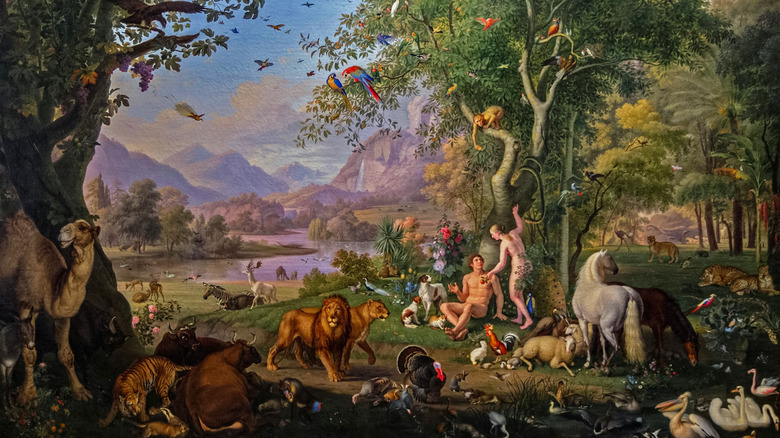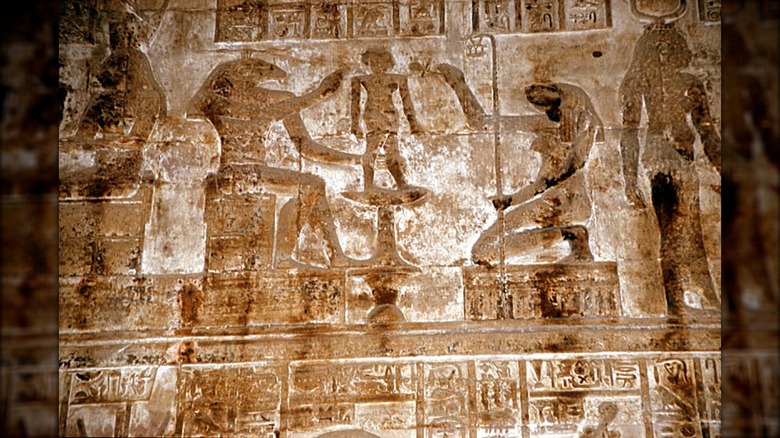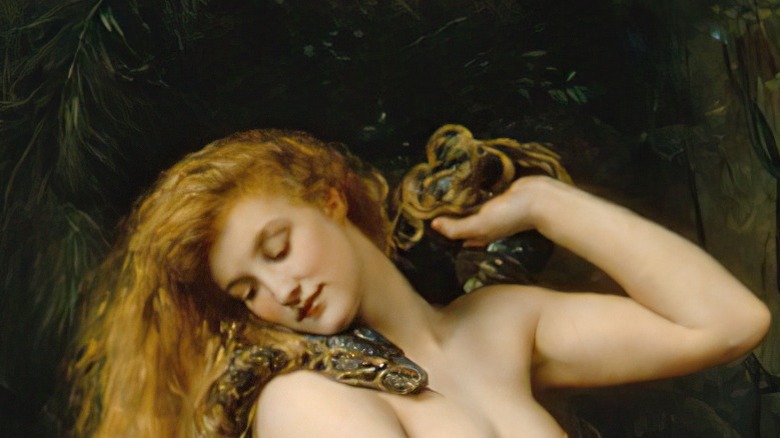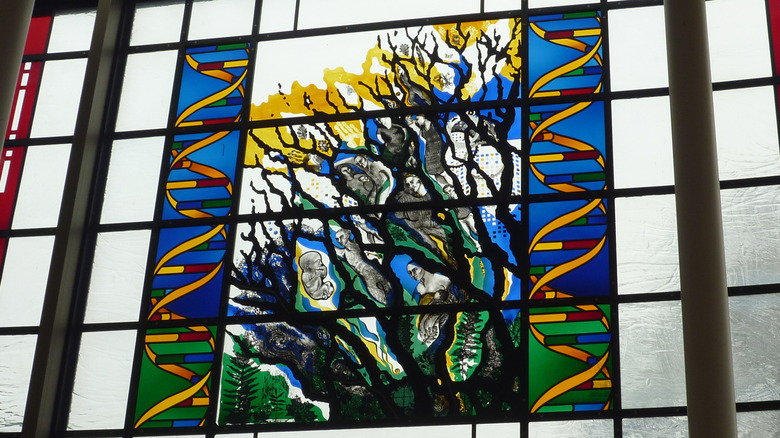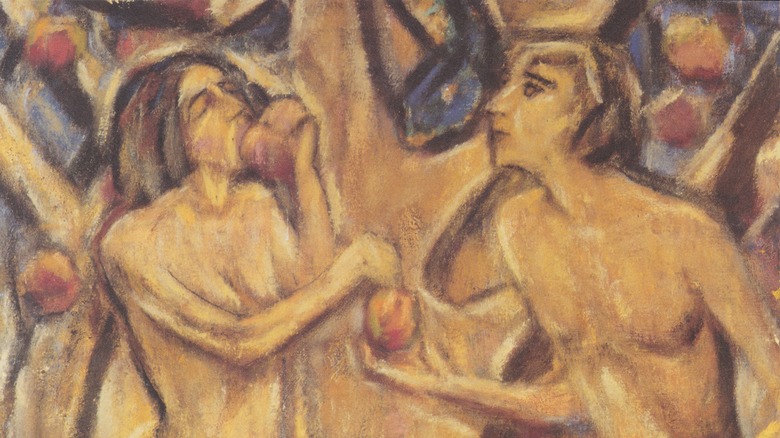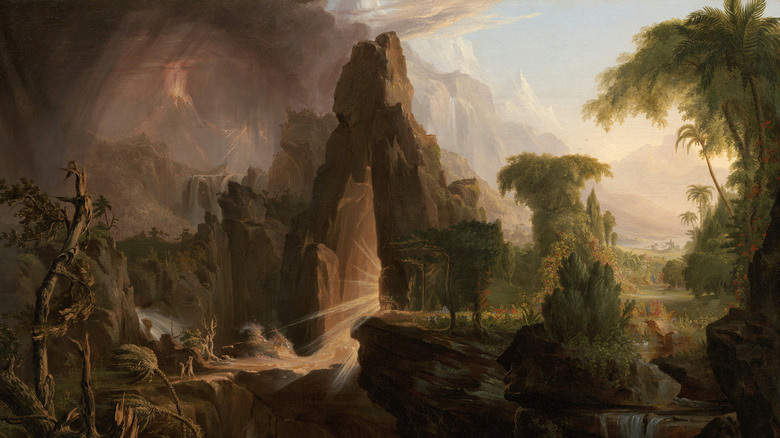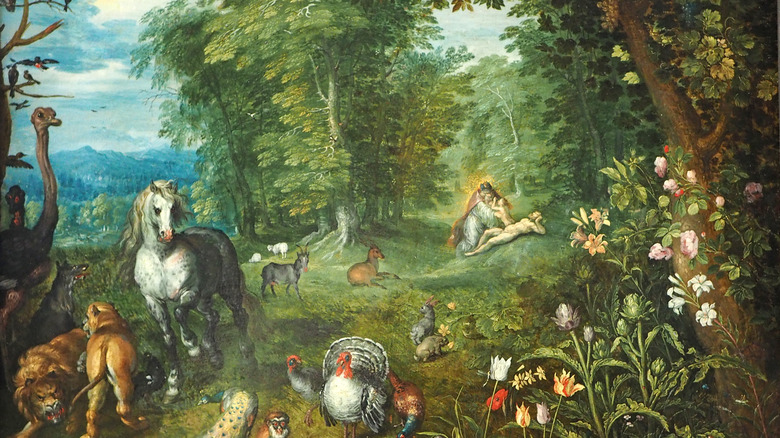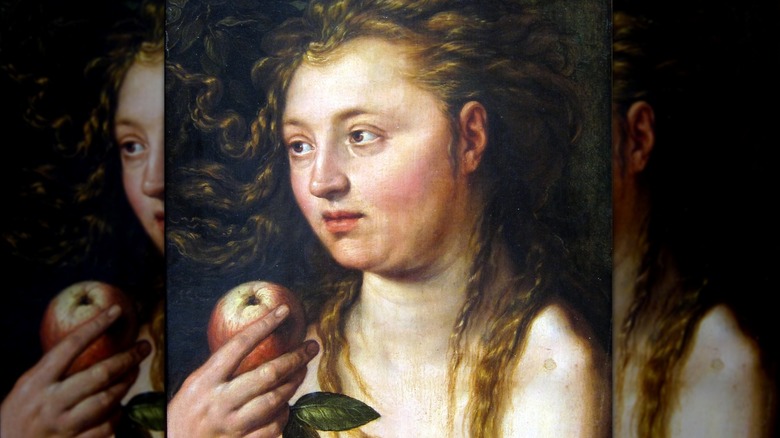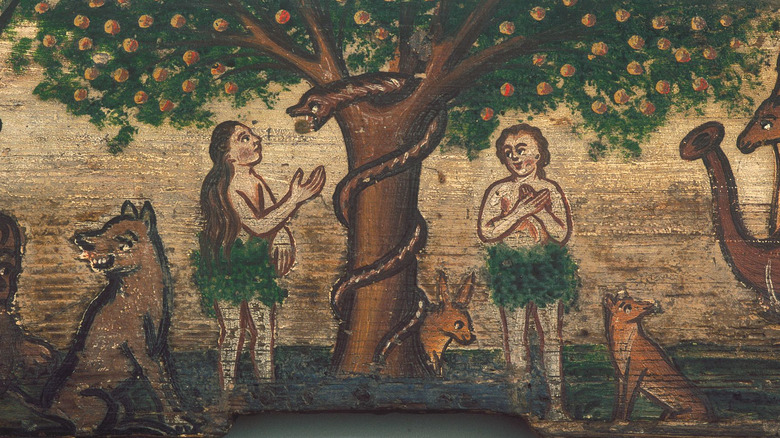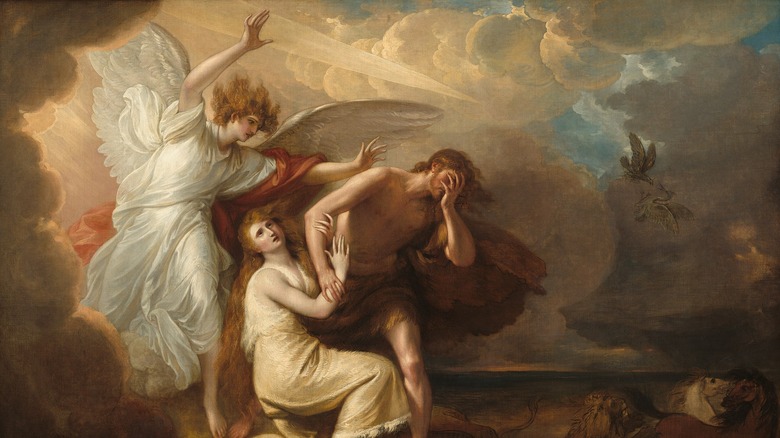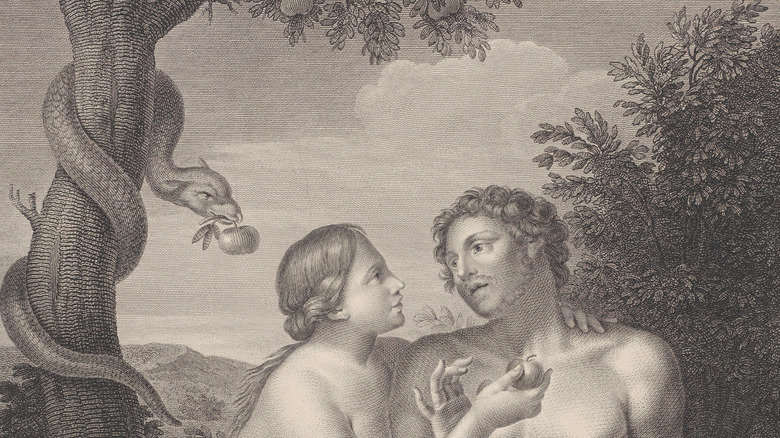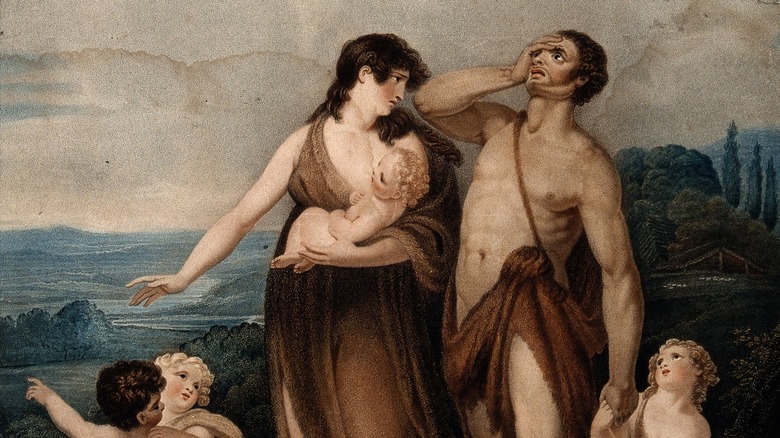Why The Adam And Eve Story Stirs Up So Much Controversy
The story of Adam and Eve is pretty fundamental. As per Britannica, the general story related in Jewish, Christian, and Muslim texts goes like this: God creates all of existence, including a lovely paradise commonly known as the Garden of Eden. Into this paradise he places a man named Adam, who's meant to take charge of all of God's creation. But Adam clearly needs a helper, so God creates the man's female counterpart, known as Eve.
All is well for a time, until a devious serpent talks to Eve and convinces her to eat from a forbidden tree that's supposed to grant knowledge. She and Adam both do just that and gain knowledge, including the realization that they're nude. They try to hide from God, who inevitably finds out that they've broken the one big rule he set for them. The two are cast out of the garden and cursed with lifetimes of toil and suffering, not just for them but for all of their descendants.
For many believers and nonbelievers alike, this is a powerful story. Yet, that doesn't mean everything in it is universally understood or accepted. The reality is that the seemingly basic story of the first couple of humans to exist is full of troubling questions that could keep a Bible study group arguing late into the night. But what's the big deal? Here's why the Adam and Eve story stirs up so much controversy.
The Adam and Eve story isn't exactly original
Though it may seem pretty unique at first glance, the creation of Adam and Eve isn't all that unique. According to the World History Encyclopedia, the creation story of the Mesopotamians, known as the Enuma Elish, shares a few similarities with Genesis. In both, the world is created out of darkness and chaos, and humans are made to recognize and maintain the glory of the world created by the gods. Of course, there are significant differences, like the multiple Mesopotamian gods and goddesses. Professor and historian Stephen Greenblatt suspects that exiled Jews living in the region were taking their cues directly from this polytheistic origin tale (via NPR).
It gets more complicated when you dig deeper. Just as God creates Adam from clay, so does the ancient Egyptian god Khnum create humans on a potter's wheel (via Britannica), and the Chinese goddess Nu Gua crafted people from riverbed clay (via British Museum).
The Greek myth of Prometheus also draws comparison. Prometheus, who was actually a semi-divine Titan, tricked the chief god Zeus by stealing fire and giving it to humans (via World History Encyclopedia). For his rebellion in bringing knowledge and power to humanity, Prometheus is tied to a rock and an eagle set to eat his liver continually. In some versions of the tale, there's even a woman created from clay, Pandora, who opens a box after explicitly being told not to do so, and therefore releases all evil into the world.
The language of Genesis hints at two couples
Careful readers of Genesis will notice something very odd: two creation stories. According to Bible Odyssey, Genesis 1 outlines God's creation of everything. Keep reading, however, and Genesis 2 details what seems like a different or additional creation story, with Adam coming first, followed by plants and animals, then Eve.
Despite attempts by later editors to mash the stories together, scholars generally agree that these accounts were created by two different authors with distinct theological takes. That can be troubling for believers, especially those who attempt to reconcile modern science with the ancient account (via BioLogos).
This matter is also disquieting because, in some interpretations, it implies that there was another human woman who was created before Eve. In some religious traditions, she's named Lilith. As per the Jewish Women's Archive, the medieval text known as the "Alphabet of Ben Sira" alleges that she would not submit to Adam, arguing that they were both made from the same material at the same time, and so were equals. Their argument became so intense that Lilith fled Adam and became a demonic figure that would eventually stalk defenseless babies. Similar demons, known as "liliths," are also referenced in previous Jewish sources from the Babylonian exile and early Islamic tradition. The Bible only mentions her once, in Isaiah 34:14, where some translations refer to a demon as a "lilith," while the King James Bible more obliquely refers to this figure as a "screech owl."
The genetics of Adam and Eve don't make sense
Genetics makes the Adam and Eve story supremely awkward. If they really were the first humans, then their children's only options for a mate would be their siblings. Today, we know that closely-related couples can have children who are at higher risk of inheriting certain genetic disorders, especially if both parents carry a copy of a recessive gene (via The Conversation).
Morally speaking, this is an awkward situation, too. As Christianity.com notes, later passages in the Bible explicitly state that incest is forbidden, though Adam and Eve's son Cain gets a pass because there were no other options and the "don't marry your sister" law hadn't been created yet. Bible.org claims that accumulating sin brought genetic issues into the world, implying that Cain — who became the first murderer after killing his brother, Abel — was sufficiently free of sin to produce healthy offspring with his sister. Adam and Eve would have been perfectly created by God and free of genetic defects, too, so some hold that their children would have been as well.
Scientists have traced the human lineage back to a "genetic Adam and Eve" who, though they likely lived at slightly different times and in different places, contributed genetic material to nearly all humans alive today (via PBS). However, there's no evidence that they were the only man and woman around at the time, just that their genes happened to pass on through the many generations that followed them.
Pre-Adamites have a controversial theory about humans before Adam and Eve
The implied incest of Adam and Eve's family can already ruffle feathers but attempts to skirt those issues have led to another contentious theory. According to some, it's possible other humans were around before Adam and Eve. Though this isn't mentioned in the Bible, it would at least take some of the pressure off the possibility that Cain and his siblings were all marrying one another.
Yet, this idea, called the pre-Adamite theory, brings issues all of its own. According to the Australian Broadcasting Corporation, people began considering this avenue around the time European explorers and colonizers began making contact with the indigenous peoples of the Americas. Some concluded that, while people like American Indians were obviously human, it was all but impossible that they shared a common pair of ancestors with Europeans. There might have been another Adam and Eve, some thought, but this threatened the Genesis story to its very core. In a far more chilling development, others concluded that these people may have existed before Adam and Eve but lacked souls and were more animal than human.
Given that this notion was practically always levied against indigenous people and never white Europeans, the pre-Adamite theory is undeniably linked to racism. In Australia, it was used to paint the native Aboriginal people as subhuman brutes and so led to the implementation of policies that treated them as such, rather than human beings with fundamental rights (via ABC).
There are many interpretations of the Adam and Eve moral
Though there's some confusion about the differences between the first two chapters of Genesis, the story told in Genesis 3 is fairly straightforward. Adam and Eve are content in the Garden of Eden, the paradise God has created for them. But then a serpent appears and tempts Eve to eat from the one tree God has explicitly told them to leave alone. Both she and Adam consume that tree's fruit and, as the King James Version of Genesis puts it, "the eyes of them both were opened, and they knew that they were naked." The pair cover themselves, are caught by God anyway, and are expelled from the Garden to face a mortal lifetime of suffering.
For many, the moral of this story is pretty obvious: don't disobey God. But, for others, that only skims the surface. It could be a story about humanity realizing its own mortality, though the Carl F.H. Henry Center argues that maybe this misses the theological point. Or, as the Bible Review puts forth, it could be that the story is a larger allegory about the "knowledge" of human sexuality.
Other theories go even farther off the path. According to Atlas Obscura, some argue that the Adam and Eve story may be linked to psychedelics, which could "open" one's mind to new knowledge. Or, as others counter, some of the key pieces of evidence here could just be poorly-painted trees that look like mushrooms.
Eve's story has been used to justify misogyny
Though both Adam and Eve are saddled with the consequences of their disobedience, it's hard to deny the reality that Eve has been blamed more often than her male counterpart over the centuries. She's been pinned as the source of all mankind's woes, all because she ate a piece of admittedly forbidden fruit. That's odd, given that, as the Washington Post notes, Eve was considered to be subordinate to Adam and subject to his leadership.
As for Eve's specific punishment, God tells her in Genesis 3:16 that "thy desire shall be to thy husband, and he shall rule over thee." The story of Adam and Eve has been used to both vilify women, seen in some Christian contexts as inheritors of Eve's sin, and to justify their continued subservience not just to their husbands, but to all men.
Though that's been the prevailing notion for ages, it's by no means universally accepted by all believers. As The Society of Biblical Literature points out, translations may have missed out on the subtleties of older Hebrew texts of Genesis, which might imply that Adam had as much culpability in the fruit-eating affair as Eve. And, as professor and author Stephen Greenblatt points out (via NPR), the misogyny isn't necessarily in the original text. Instead, it has more to do with Augustine of Hippo, an early figure in the Christian church who was one of the first to pin Eve with the supposed "crime."
Childbirth became a battleground because of Eve's story
The story of Eve has generated particular controversy when it comes to bearing children. According to Genesis 3:16, God tells a post-rebellion Eve that she will now endure painful childbirth, with the implication that all women are doomed to the same fate. Eventually, people began to assume that the pain of birth was simply the due of all women, thanks to their female ancestor. Martin Luther even wrote that the agony of childbearing brought women closer to God, according to the Journal of Anesthesia History, though it's worth noting that Luther himself never gave birth.
As staunchly held as this viewpoint may have been throughout the ages, an earlier incident in Genesis provided a rebuttal. As per the American Society of Anesthesiologists, obstetrician James Simpson learned that chloroform could dull the pain of birth. Some religious authorities reacted strongly, calling Simpson's findings Satanic and even threatening to deny baptism to children whose laboring mothers opted for anesthesia. Others claimed it was a choice between "natural" pain or "poison." Simpson argued back that Adam had been put to sleep by God for the operation of turning a rib into a wife. If Adam and modern men could be given pain relief, why should it be denied to women? Though some may argue against it today, however, the presence of anesthesiologists in hospital labor and delivery units proves that many are ready to argue against the apparent moral of Genesis 3:16.
Some aren't convinced they knew right from wrong
The presence of the tree of knowledge presents both a serious moral quandary that is bound to start arguments aplenty in divinity schools and churches everywhere. According to Bible Odyssey, it's more specifically the tree of knowledge of good and evil. What exactly constitutes "good" and "evil" varies from theologian to theologian, but common interpretations hold that eating the tree's fruit can give someone wisdom, sexuality, omniscience, or a sense of morality. Though the text of Genesis itself can be frustratingly vague, it's clear that Adam and Eve gained some sort of knowledge or understanding after eating the fruit. That knowledge then fundamentally changed how they saw themselves, each other, and the rest of the world.
But what about the time before they bit into the tree's bounty? If the tree granted knowledge of good and evil, then could Adam and Eve have known that they were doing wrong beforehand? According to Apologetics Press, one take says that Adam and Eve would have had technical knowledge of good and evil. They knew that their existence in Eden was "good" and that God had forbidden eating from that one tree. Yet, they might not have fully understood the depth of their rebellion until after the sin had been committed. Got Questions argues that the pair were still created to be intelligent, mature adults who knew what they were doing, but there's enough leeway here for many more generations of debating.
People aren't sure that this pair started original sin
Depending on the church you visit or the religious leader you ask, original sin may or may not exist. Whether or not it does is kind of a big deal, as some religious rituals (like infant baptism) hinge on the idea. According to the BBC, the concept of original sin centers on the idea that we are all born with the desire to do evil and act against God's will, thanks to the original disobedience shown by Adam and Eve. Even newborn infants are believed to carry this potentiality for evil, though the faithful are expected to resist. It's important to note that this concept doesn't come straight from the Bible, though Britannica notes that St. Paul might have been obliquely mentioning it when he wrote in Romans 5:12-19 that Adam brought sin and death into existence. The idea of original sin only really got going when early Christian theologian Augustine started writing about it in the 4th and 5th centuries (via Utne Reader). It was only officially accepted into the Catholic Church in the 16th century, as per the BBC.
Despite the centuries of history behind the doctrine, not every Christian believes in original sin, according to Britannica. Yet, this presents a serious problem for Christians who believed that Jesus was crucified to atone for the hereditary sin kicked off by Adam and Eve.
The serpent may not have been Satan
In the story of how humanity got kicked out of Eden, there's a pretty clear villain: the serpent. Although both Adam and Eve are held responsible for their actions, they're not the only ones who face divine punishment. According to Genesis 3:14, the serpent is cursed by God to crawl around on its belly and eat dust for the rest of existence.
Given its place at the heart of the fall of humanity, the identity of the serpent must be obvious. It's Satan, of course. Only, that's not so clear. According to the Biblical Archaeology Society, the serpent is never identified with such a figure. In fact, the ancient Hebrews didn't recognize a chief evildoer at all, much less one named Satan (though there are figures called a "satan" who sometimes act as a kind of prosecuting attorney for God). It doesn't even happen in the Christian New Testament. Instead, the identification of this mysterious serpent with Satan is a later cultural invention.
That doesn't stop modern believers from making the connection, anyway. Answers in Genesis, which is connected to Young Earth creationism and led by Christian fundamentalist Ken Ham (via Answers in Genesis), argues that the serpent could still have been influenced by an unseen and unmentioned Satan. Bring up this question at Kentucky's Ark Encounter — also helmed by Ken Ham — and you'll be sure to start a spirited debate in mere minutes.
Some argue that the Fall was a good thing
Ultimately, we can surely agree that the Adam and Eve story is a serious bummer. The pair are cast out of a paradise on Earth and must now live a life full of toil and pain. There can't possibly be any upside to the grim conclusion as Genesis moves on to other stories.
Not so fast, say some thinkers. It could be that the Fall, as awful as it may have been in the moment and for quite a few generations after, was still a net good for humanity. According to the Religious Studies Center at Brigham Young University, the Church of Jesus Christ of Latter-day Saints teaches that the Fall was necessary for humans to experience life in all of its complexity, much less the joy of redemption. Mormons aren't alone in this view, either. Earlier Christian thinkers, like St. Ambrose and Thomas Aquinas, held similar views that the Fall was necessary to achieve a greater and more lasting moral good.
This concept of a "fortunate Fall" actually has a name, the Latin felix culpa. According to "A Dictionary of Biblical Tradition in English Literature," this phrase is part of a 4th-century Catholic hymn still sung today. Even so, other writers and thinkers like John Milton, famous for writing the 17th-century epic poem "Paradise Lost," persist in the belief that it would have been better if Adam and Eve had followed instructions and stayed in Eden.
